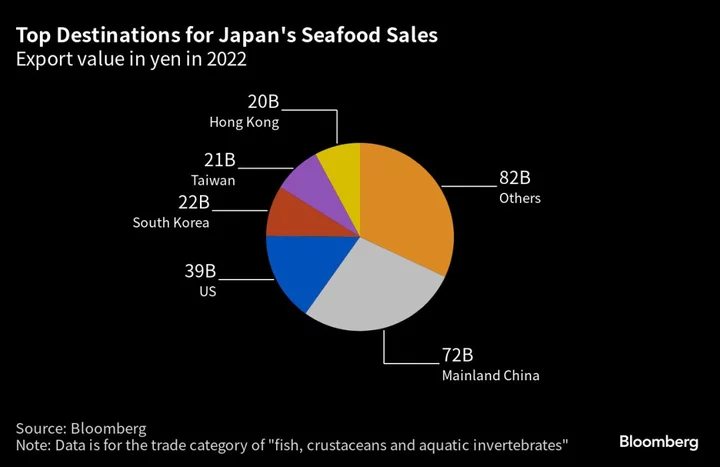China vowed to take “necessary steps” to safeguard food safety and the marine environment after Japan set a date to begin flushing treated nuclear wastewater from the Fukushima site into the Pacific Ocean.
“This act blatantly transfers the risk of nuclear pollution to neighboring countries, including China and the international community,” China’s Deputy Foreign Minister Sun Weidong said in a statement. “It is extremely selfish and irresponsible. China expresses serious concern and strong opposition.”
Beijing, which has criticized Japan’s proposal as unsafe and questioned the accuracy of its testing regime, “will take necessary measures to firmly safeguard the marine environment, food safety and public health,” if the water releases go ahead as planned from Thursday, he said.
Japan’s Prime Minister Fumio Kishida, who on Tuesday confirmed plans to start the wastewater releases, is preparing to meet with China’s Premier Li Qiang next month, NTV reported.
Read More: How Japan Will Release Its Nuclear Wastewater Into the Pacific
China’s retaliation threatens agricultural and seafood purchases from Japan, which totaled about 278 billion yen ($1.9 billion) last year. Hong Kong, which imported about 209 billion yen worth of the goods, on Wednesday confirmed it will extend import curbs on products from seafood to seaweed from some areas.
Hong Kong’s Michelin-starred Godenya previously said it would seek alternative suppliers for key ingredients sourced from Japan, and new trade curbs will threaten to crimp sales for Japan’s major seafood producers. Maruha Nichiro Corp. wins about 5% of revenue from destinations in Asia outside its domestic market, according to data compiled by Bloomberg, while Nishimoto Co. generates around 8% of sales outside of Japan, North American and Europe.
Suppliers of sea salt and related products jumped in Tuesday trading in South Korea, where the condiment is crucial in the preparation of kimchi. Insan Inc. surged as much as a 30% daily limit, and Daesang Holdings Co. as much as 26%.
Tokyo Electric Power Co. is preparing to begin a process to release about 1.3 million cubic meters of wastewater — equivalent in volume to about 500 Olympic-size swimming pools — from the Fukushima site over a period of at least 30 years. The waste has been generated in part as the utility works to cool wrecked reactors following the 2011 meltdown that ranks as the world’s worst atomic accident since Chernobyl.
Kishida has rejected China’s complaints over the safety of the strategy and pointed to a two-year review by the International Atomic Energy Agency, which concluded there would be a negligible impact on people and the environment.
Japan’s ambassador to China, Hideo Tarumi, who was summoned for talks with Sun, criticized Beijing for making what he claimed are unsupported claims and offered to continue talks on the issue. It’s unacceptable for China to tighten curbs on Japanese food products if not based on scientific evidence, Japan’s foreign ministry said in a statement.
--With assistance from Shoko Oda and Kevin Ding.

